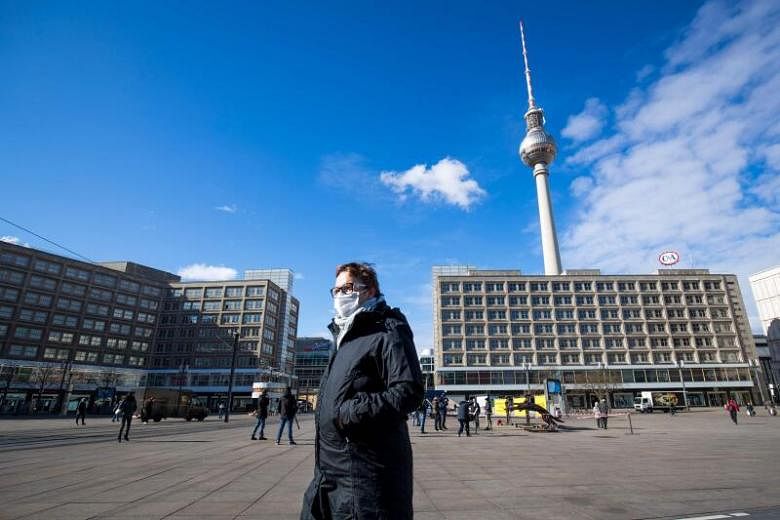BERLIN - Officially, German politicians display a sense of calm and authority as the country grapples with the coronavirus outbreak. Behind the scenes, however, an intense battle is taking place over how long the country can sustain a lockdown.
With every additional week, new alarming reports are surfacing about the damage from the standstill.
While some politicians are already speculating about a possible exit date, others have vowed that existing strict measures have to be tightened even further.
German economists unanimously expect a major recession, with figures from renowned Munich Ifo institute showing a downswing of more than 20 per cent in the worst-case scenario.
The German economy ranks No. 4, behind the US, China and Japan, globally.
The International Monetary Fund (IMF) in a statement this week painted a bleak picture for the whole of Europe.
"Covid-19 has struck Europe with stunning ferocity. While we do not know how long the crisis will last, we know that the economic impact will be severe," said the statement on the IMF website.
"A deep European recession this year is a foregone conclusion," it added.
The German Ethics Council, an independent panel of experts working on societal questions, in a recent paper to the ministry of health has warned against "a breakdown of the whole system of the market economy".
It urged the government to constantly review the measures and when they could end. The public needed to know "under what circumstances the way back to normalcy can be taken", said the council.
Dr Alexander Dibelius, long-time head of investment firm Goldman Sachs in Germany who since 2015 is also managing partner of CVC, a private equity company, went even further.
In an interview, he said: "Is it right that 10 per cent of the population is being spared, but 90 per cent, including the entire national economy, is extremely hampered, with possibly dramatic consequences for the basis of our general prosperity which will be massively eroded?"
Dr Dibelius, a former medical doctor, warned: "For centuries we have fought for our individual freedoms at all levels, for laws and human rights. And, all of a sudden, much of this is simply wiped away practically overnight."
The Ethics Council echoed his sentiment, saying decision making should not be delegated to virologists or other medical experts. The elected representatives of the people ought to be in charge, said the council.
In fact, many Germans are puzzled by the scope and pace of the restrictions and interference in personal freedoms that have resulted from the measures being implemented.
A contact ban, in place for around 10 days, is confining most citizens and other residents to their homes. For now, the ban is set for two weeks, but it almost certainly will be extended or even turned into a curfew if the effects are insufficient to curb the outbreak.
The legal basis for the measures is the German infection protection law. The provisions under the law, however, are supposed to be in place only temporarily.
Experts are now beginning to debate on what a temporary time scale should be.
Afraid of being challenged in court, Parliament has swiftly amended the legislation, significantly extending the powers of the executive.
Another contentious issue has been the use of mobile data. Tapping into people's location data on their mobile phones to trace who has come into contact with those infected certainly will ignite a new debate on civil liberties.
Germany has some of the strictest privacy laws in the world. The topic is particularly sensitive given the role of the secret policy during the Nazi past as well as in the former East Germany. Then police was spying extensively on its citizens.
A compromise solution could be the adoption of a smartphone app similar to the one used in Singapore.
The TraceTogether app is seen as effective, but at the same time ensures people's privacy. Should the smartphone's owner test positive for Covid-19 that data could be downloaded so that contact-tracing teams can quickly get in touch with others at risk.
"We are confident we can release the solution in the next few weeks," said the Fraunhofer Institute for Telecoms, Heinrich Hertz Institute (HHI).
The HHI, one of Germany's institutes for applied research, said it was working with others across Europe to develop an app that would enable the proximity and duration of contact between people to be saved for two weeks on cellphones anonymously and without the use of location data.












